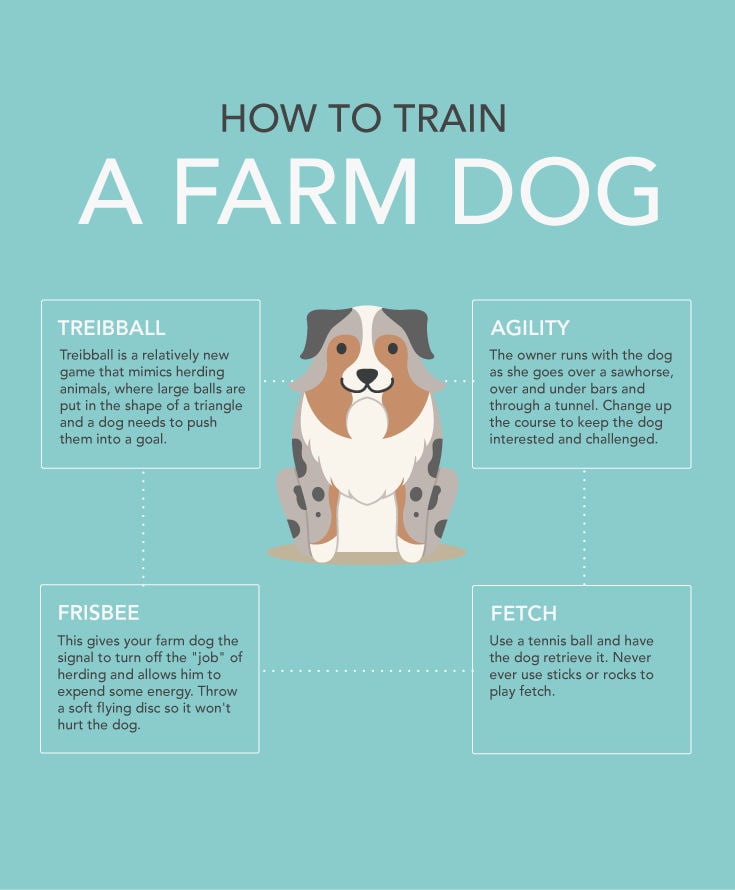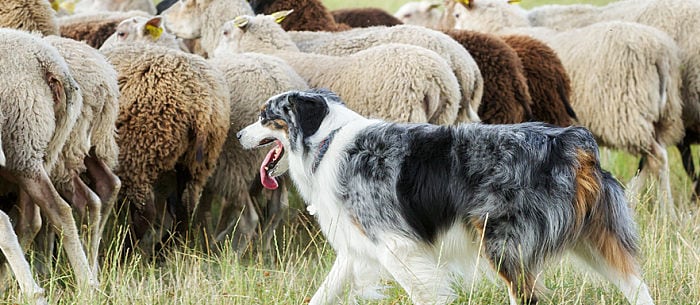You’ve seen herd dogs before, whether it’s in a movie or on a farm. You definitely think they’re cool but aren’t sure if they’d make a good house dog. Farm dogs are bred specifically for the purpose of working on a farm or ranch as either a herding or guard dog. Herding dogs like border collies, Australian cattle dogs or Welsh corgis herd livestock.
“Border collies are smart, hardworking dogs bred to do a job. Because of their high energy, they get frustrated if they don’t have an outlet,” says David Kennard of Wellscroft Farm in Harrisville, New Hampshire, who has been breeding border collies for 38 years. Guard dogs like Great Pyrenees and Rottweilers are both considered farm dogs, bred to protect livestock, according to Hobby Farms.
How are Farm Dogs Different From Regular Dogs?
Kennard warns people to be careful of owning working farm dogs, because the dogs (by their very nature) have a job to do and might not make the best family pets. “They are wonderful pets for farmers, as there is a time to work and a time to play,” Kennard says.
He suggests if people want the high energy of a herding dog, they could adopt a cross breed, such as a Lab and collie mix. With mixed breeds, the herding instinct is diminished and the dog won’t be as high energy and constantly seek to herd.
According to the American Society for the Prevention of Cruelty to Animals, dogs bred to herd may chase or stalk. If put into a more urban situation, border collies have a higher rate of death by automobile, as they will try to herd cars and trucks, says Kennard. It’s important to choose a breed or mix of dog by doing research.
“When ‘101 Dalmatians’ was popular, many people got Dalmatians, and many ended up in shelters because people didn’t research the breed,” says Maryann Hatch of Northborough, Massachusetts, who has owned Rottweilers for over 20 years along with non-farm dog mixed breeds. Working Dalmatians are known to guard fire stations and have directed fire horses for centuries, according to the National Fire Protection Association.
Base the breed on your lifestyle, living situation and the exercise and attention you can reasonably provide. Most families won’t be using their typical house pet for herding or guarding livestock. Farm dogs may not be as lethargic or appreciate downtime as much as the domestic dogs you’re used to.
“They like to work, it’s what they were bred for,” Hatch says. “They like to chase a ball around and exercise is important. They must get enough mental stimulation in the form of exercise and playtime.”
What’s Training Like?
If you do have the wide-open space and the time to give to a farm dog (and maybe even some official tasks for him to do), know your relationship will be more of a partnership than a regular dog parent-dog companionship. “Every dog has affection for his owner but with farm dog breeds, you are more of a team with a job, mission and a role to herd or guard,” says Kennard. Training is specific to the breed and the role your farm dog will assume, so check with your breeder first. Farm dogs have boundless energy and need to challenge their brains. Here are four games to play with them that also assist with general training:
Farm dogs have boundless energy and need to challenge their brains. Here are four games to play with them that also assist with general training:
- Treibball
Treibball is a relatively new game that mimics herding animals, where large balls are put in the shape of a triangle and a dog needs to push them into a goal. (According to the National Association of Treibball Enthusiasts, it was invented to teach just that!)
- Agility
The owner runs with the dog as she goes over a sawhorse, over and under bars and through a tunnel. Change up the course on a frequent basis to keep the dog interested and challenged.
- Frisbee
This gives your farm dog the signal to turn off the “job” of herding and allows him to expend some of that never-ending energy. Throw a soft flying disc so it won’t hurt the dog.
- Fetch
Use a tennis ball and have the dog retrieve it. Never ever use sticks or rocks to play fetch.
Laura Richards is a Boston-based freelance writer and the mother of four boys including a set of identical twins and also mom to three rescue pets: Scarlett, a 7-year-old beagle, and Edith and Ollie, 15-year-old identical twin black cats. She has written for numerous parenting publications and is the president of On Point Communications.



